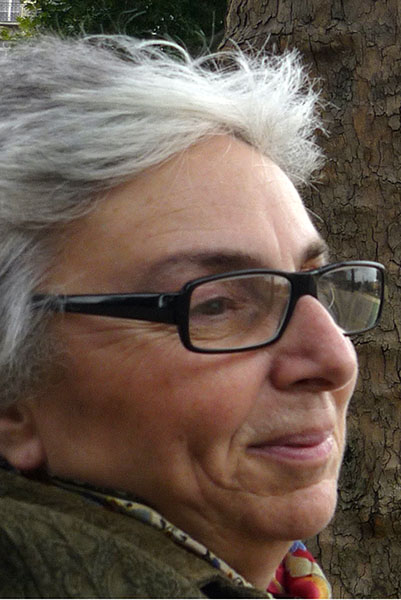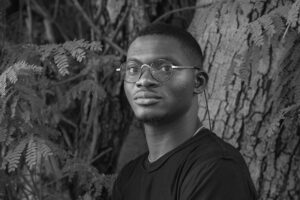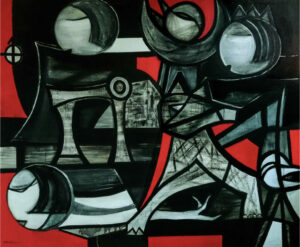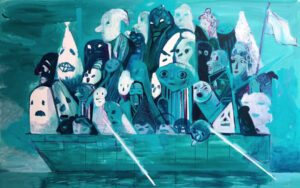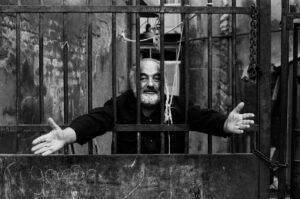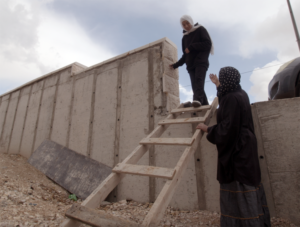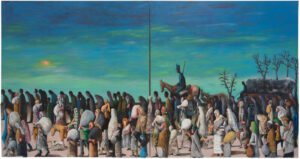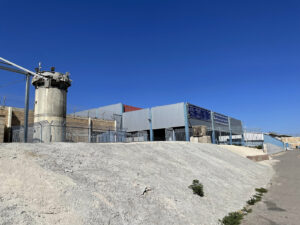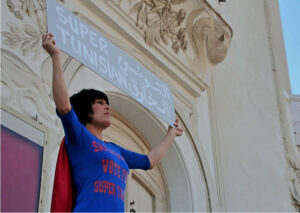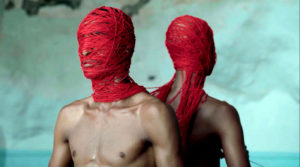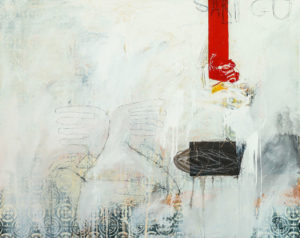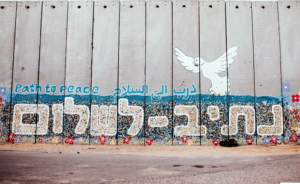
Should the Wind Drop / Si le vent tombe (2020), directed by Nora Martirosyan
A coproduction of France/Armenia/Belgium • 100 min • 1.85 • color • 5.1
In French, Karabaghtsi, Armenian, English and Russian, English or French subtitles
This film is available on VOD platforms with French subtitles; a version with English subtitles will become available shortly.
Taline Voskeritchian
Nora Martirosyan’s Should the Wind Drop (Si le vent tombe, 2020) belongs with a handful of films set in Nagorno-Karabakh, the contested region in South Caucasus and the site of the first perestroika demonstrations, subsequent wars of various duration, and Armenian victories and defeats. But the film departs from the conventions that have straddled several such films. Chief among these conventions is the focus on the actual conflict between Armenia and Azerbaijan, and indirectly on the duty of the film to give voice to the cause of Karabakh self-determination, independence, and recognition by what used to be called the international community.
Add to these, a love-story of some sort, a few cute ethnic curiosities, and the obligatory mournfulness of the film score, and you have the formula for a film that can, ostensibly at least, appeal to Western audiences who know very little, and care less, about Karabakh. Should the Wind Drop consciously steers clear of these baits.
Since the Armenian victories of the First Karabakh War, which ended with a ceasefire in 1994, Nagorno-Karabakh had been in a state of uneasy peace until September 2020, when the Azerbaijanis defeated the Armenians, regained territory lost in the war of the early 1990s, absorbing new lands and inflicting heavy losses in personnel on the Armenian side. Although Should the Wind Drop is set in that period of tenuous peace prior to September 2020, war is not far — in the areas around the Karabakh-Azerbaijan border, in the conversations and pronouncements of the local population, and in the difficulties of everyday life of Stepanakert, the capital. There, a French auditor of dogged professionalism and cool anxiety, Alain Delage (played by Grégoire Colin) arrives one day to write a report about the feasibility of restarting the operations of the airport. The actual airport is not a particularly pleasant site, but its two wings, and their blue color, are a not-so-subtle metaphor for the aspirations of the population: A proper airport will make life in this landlocked republic, whose self-declared independence is not recognized by any UN-member country, more open to the world. It will make Karabakh more visible; it will give the country a future.
https://vimeo.com/637424185
Alain himself is a rather standoffish type, who stiffens when his host at the airport welcomes him with a big hug. He is not particularly likeable; he is here to do a job and often seems oblivious to the local officials’ impassioned pleas. He is a stranger to everything that he encounters — from that hug to the black-haired boy he sees crossing the airport runway, to the town’s annual festivities of vartavar — a tradition of people drenching each other with water. The airport officials’ aspirations are to make Nagorno-Karabakh and its problems visible to him, to persuade him, coax him if they can.
These aspirations, too, are the ones that propel the film’s director herself: to make Karabakh visible, palpable, real. The way Nora Martirosyan goes about doing so is through a series of rejections which are quite radical, both in relation to the content of the film and also the practices of such films that come out of a historical injustice — a political situation where the cards are stacked against the victims: Should the Wind Drop does not involve a love story; the structure is not dramatic; the film has no place for the ethnic-as-exotic; war lurks at the film’s edges only.
The most important departure is that the two narrative threads — of Alain trying to do his professional work, and of the boy Edgar (played with remarkable skill by Hayk Bakhryan) trying to do his work — do not intersect, dashing viewer assumptions, but also setting our visual attention free. Our “hero” is no hero; and Edgar is really no victim although the harshness of his situation is beyond doubt.
In terms of technique, Martirosyan relies on long shots, uses close-ups sparingly, makes distance an organizing principle, refuses the aid of melody and instead employs composed sound for moments of tension. Taken as a whole, the film’s content, form, and technique poke at narrative flow, question its centrality, and, most important, open a space for another kind of telling.
Paradoxically, although Martirosyan’s telling is more episodic, it is at the same time more panoramic; characters are often diminished not so much by their flaws or their recklessness but by their native geography, by the circumstances of war as is the case, for instance, with Armen (played by the great Armenian parodist and performance artist Vardan Petrosyan).
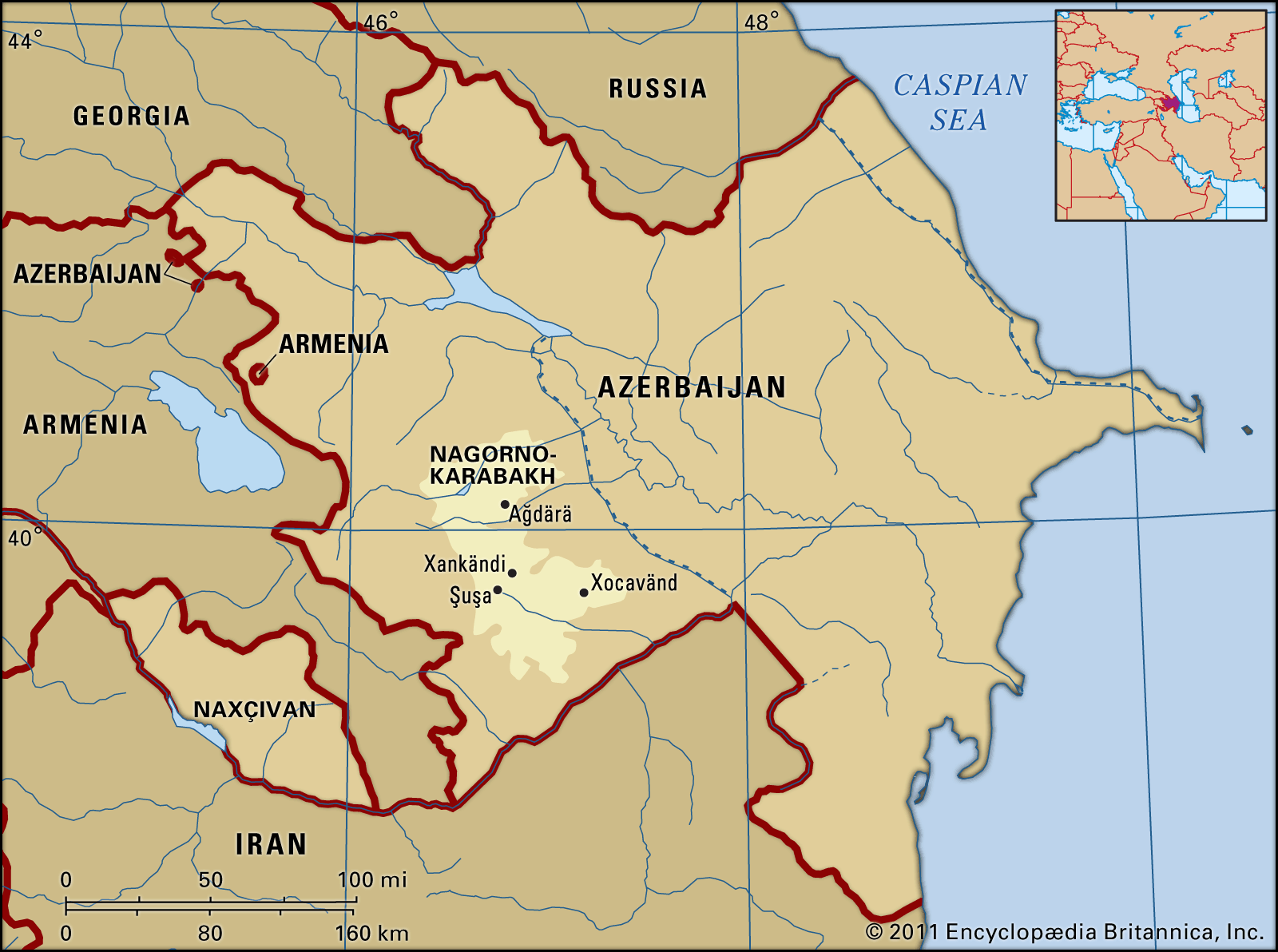
Karabakh is contested land but also a wounded Garden of Eden whose mysterious beauty we know is laced by violence, though there is little violence in the film. No violence, and no sex — absences which allow for neither pathos nor excitation.
Should the Wind Drop is a film about approach, not destination. Martirosyan, a native of Armenia, was trained as a painter there and now lives and works as a film and video artist in France. Her approach — in both senses of the word — is painterly and relies on perspectives that shift, as is the case in the long and dizzying scene of Alain’s arrival by car to Stepanakert, the tiny vehicle snaking through the awe-inspiring mountains; or toward the end of the film in night scenes along the border areas, or in the shouts of Edgar who is trying to recover a loss. For sure, the film has its share of scenes of camaraderie — of men joking and drinking, and homesteading; of women manning the clothing store, or putting food on the table, or standing at the hospital’s balcony and showing the newborn infant to the father below on the street. But absent from these scenes is the kind of intimacy associated with human contact and touch — the turn of a face, the hint of a smile, the extension of a hand, things that would seal the foreigner’s fate in this far-off land.
It’s easy to interpret this absence as the filmmaker’s distance from her material, or even an aesthetic coldness. But it may be more generative to think that with this kind of withholding, Martirosyan is showing the dignified, stoic discipline which those embattled by war and loss know well and practice even better. Nowhere is this technique as effective as it is in the impossible meeting of Alain and Edgar, or of their paths not crossing each other around a climactic moment. It does not happen, Martirosyan seems to be saying, because in real life, in places where the earth is scorched with war, where hearts are hardened by loss, such things usually don’t happen. And yet, for all the distance and the panoramic intentions of the film, one of the most memorable images is that of Edgar’s face turning — to Alain? to us? — in a mixture of sorrow, pleading, and precautious wisdom. (The viewer cannot but be reminded of that other great turn of a boy’s face in Francois Truffaut’s Les 400 Coups.)
It’s as if in this scene, Edgar tears the surface of the film, and asks us to look at him, at this boy who is the bringer of water, the quencher of thirsts. There are other, smaller scenes like this one, which seem to come to us with the force of big emotion, but which recede as fast as they arrived. Their brevity is their strength.
The hold of Nagorno-Karabakh on the Armenian imagination — historical, cultural, and political — is as enduring as it is pervasive. Should the Wind Drop displays a gallery of characters, all local, all natives of Nagorno-Karabakh, but often it steers clear of turning character and narrative into a vehicle for transmitting information about the enclave’s history or its just cause. It is the land which takes on almost all these duties — the land, which talks, as it were. Martirosyan’s polyglot film (in five languages) gives the Karabakh dialect more than lip service, so to speak. The land is all-powerful, all seeing in whose shadow people are made small but not insignificant.
Such an approach risks turning the land into something mythic, eternal, bigger than human desires and sorrows, even bigger than the airport they want to re-open, bigger than the war even. This kind of aestheticization may offer an alternative perspective, one based on painterly principles, but at times it neutralizes the vitality — the sorrow, loss, brief joys — of the human beings who inhabit the land, who guard the borders. Actually, Martirosyan peoples the film with an array of characters we won’t easily forget — from Seiran, Alain’s guide, to Armen, to the soldiers who accompany Alain to the border areas, even the woman who cleans the airport’s floors, an anonymous presence whose face we do not see but whose floors shine. About all of them, we know next to nothing because the land is all encompassing. Perhaps the ferocious beauty of Nagorno-Karabakh as it is depicted in the film comes at the expense of characters who ask for more depth, more development.
Among these characters, the boy Edgar is the most memorable creation — he is an all-pervasive presence who brackets the film. But Martirosyan does not romanticize him, nor does she burden him with more injuries than he carries, injuries that would make him more appealing to non-Armenian viewers. He has enough, she seems to be saying. The two narrative threads — of Edgar and Alain — never explicitly entwine, and the two characters’ distance from each other only intensifies the silence beneath the surface of the film. This distance also carries figurative meaning that spans across the entire film.
With Should the Wind Drop, Martirosyan steps into experiment, asks a question: How to represent the near-magical, scorched land of Nagorno-Karabakh — or any other place ravaged by war — without the crutches of sentimentality, melodrama, even drama? It’s a significant question, and one that she begins to answer here. The land is her point of departure and return, the land whose illusory peace the 2020 war shattered, whose expanse it tore into two, whose population it displaced and turned into refugees. But also, the land as a repository of pitfalls for the filmmaker, the viewer, and in the end, for those who live with it — not only for its acquisition and loss, but also for its flames, which the film reveals with such vivid torrent.
In the wake of the 2020 war, Should the Wind Drop is now, ironically, a document, a chronicle of another time. The new realities on the ground await the arrival of the one who comes to survey, to restore, to make the invisible visible after so much has been lost in land, human lives and hopes to the winds and fires of war. Edgar’s turn to the screen is even more wrenching today in his — and the film’s — search for answers.



